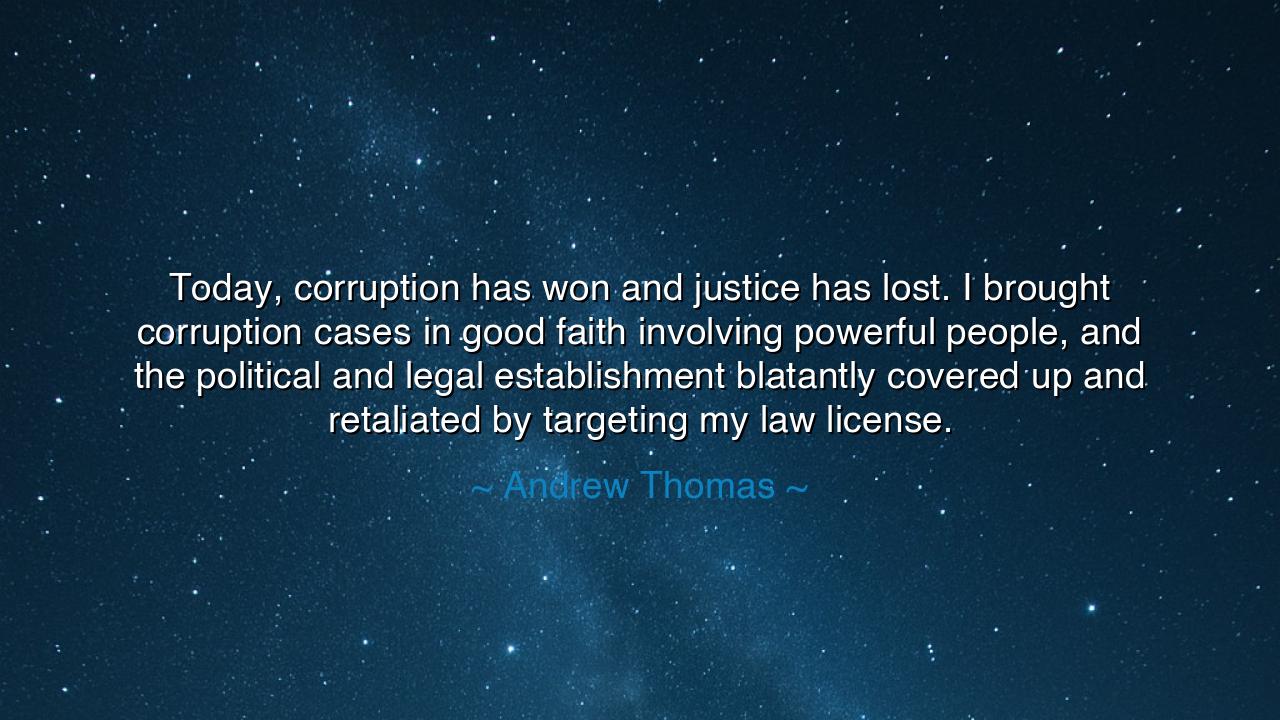
Today, corruption has won and justice has lost. I brought
Today, corruption has won and justice has lost. I brought corruption cases in good faith involving powerful people, and the political and legal establishment blatantly covered up and retaliated by targeting my law license.






Host: The room was quiet, the dim light from the lamp casting a warm, introspective glow across the table. Outside, the world had quieted, and the peaceful rhythm of the evening filled the air. Jeeny sat at the table, her fingers lightly tracing the rim of her cup, clearly absorbed in the words she had just read. Jack, standing near the window, gazed out into the darkened world, his thoughts clearly deep. The air between them felt thick with anticipation, as if they both felt the weight of the topic about to unfold.
Jeeny: (breaking the silence, her voice calm but reflective) “I came across something by Andrew Thomas today that really struck me. He said, ‘Today, corruption has won and justice has lost. I brought corruption cases in good faith involving powerful people, and the political and legal establishment blatantly covered up and retaliated by targeting my law license.’ What do you think about that?”
Jack: (pauses, his voice thoughtful) “It’s a deeply disheartening statement, isn’t it? Thomas is speaking from a place of profound frustration, and it highlights a painful reality—sometimes, when people fight for justice, they don’t just face resistance; they face retaliation from the very institutions that are supposed to uphold justice. The idea that the legal and political systems would protect corruption rather than support someone who’s trying to expose it speaks to a much larger problem. It’s a sign of how power and influence can sometimes trump integrity.”
Jeeny: (nodding slowly) “Exactly. It’s a brutal reality for many people who try to take a stand against powerful forces. The institutional forces that are supposed to support justice can often be the ones protecting the corrupt, making it incredibly difficult for those seeking justice to succeed. Thomas is saying that, despite his good intentions, the system not only failed to protect him—it actively turned on him. It’s a sign that when corruption runs deep, even the legal system can become complicit in it.”
Host: The stillness in the room deepened as the conversation continued. Jack turned slightly toward Jeeny, his expression softening as he considered the broader implications of Thomas’s words. Outside, the world had quieted, but inside, their conversation had turned inward, reflecting on the complexities of justice, corruption, and the power dynamics that often determine the outcome of legal battles.
Jack: (his voice quieter now, more introspective) “What strikes me is how cynical this quote feels. It’s a recognition that, sometimes, fighting for what’s right doesn’t lead to victory, but to personal destruction. It highlights the disillusionment that can come when someone tries to confront corruption, especially when those with power are willing to sacrifice justice to protect their interests. The failure of the system to protect Thomas, despite his good faith efforts, suggests that justice is often secondary to political interests.”
Jeeny: (softly) “Yes, and I think it speaks to the fragility of justice when it’s dependent on systems that are already flawed or compromised. It’s easy to assume that legal structures exist to protect us, but when those structures are corrupted, it becomes almost impossible to fight for what’s right. Thomas’s experience shows just how hard it can be to break through that corruption when the system itself works to protect it. It’s a harsh reminder of how power and influence can often outweigh truth and integrity.”
Jack: (nodding slowly) “Exactly. And I think that’s why his words feel so raw—because they come from a place of betrayal. He trusted the system to do the right thing, to help him in his pursuit of justice, but instead, it turned against him. In a world where those in power are willing to shield corruption, even good people can be crushed by the system they thought they could rely on.”
Jeeny: (smiling gently) “Yes, and it’s a reminder that accountability is essential for justice to truly exist. When systems become self-serving or when those in power use their influence to protect their own interests, true justice can’t prevail. Thomas’s experience is a cautionary tale that shows how easily corruption can infiltrate even the most trusted institutions, and how those who try to fight it can often find themselves alone and vulnerable.”
Host: The quiet between them grew deeper now, as the conversation continued. Outside, the world had quieted, but inside, the room was filled with a shared understanding about the complexities of corruption and justice. Jeeny and Jack had uncovered a deeper truth in Thomas’s words—that sometimes, the systems we trust to uphold justice can be the very systems that allow corruption to flourish, leaving those who fight for integrity facing retaliation instead of protection.
Jack: (smiling softly, his voice more assured) “It’s a reminder that power must be held accountable if we want true justice. The systems that exist to protect us must also be protected from those who would use them for personal gain.”
Jeeny: (nodding warmly) “Exactly. Justice can only prevail if the systems in place to uphold it remain transparent, unbiased, and committed to truth. If corruption infiltrates these systems, then everyone suffers.”
Host: The world outside had quieted to a peaceful stillness, but inside, the room was filled with understanding. Jeeny and Jack had uncovered the deeper meaning in Thomas’s words—that justice is only possible if the systems that uphold it are transparent and accountable. The night continued outside, but inside, the room felt full of the realization that the fight for justice requires not only courage but the integrity of the systems designed to protect it.






AAdministratorAdministrator
Welcome, honored guests. Please leave a comment, we will respond soon